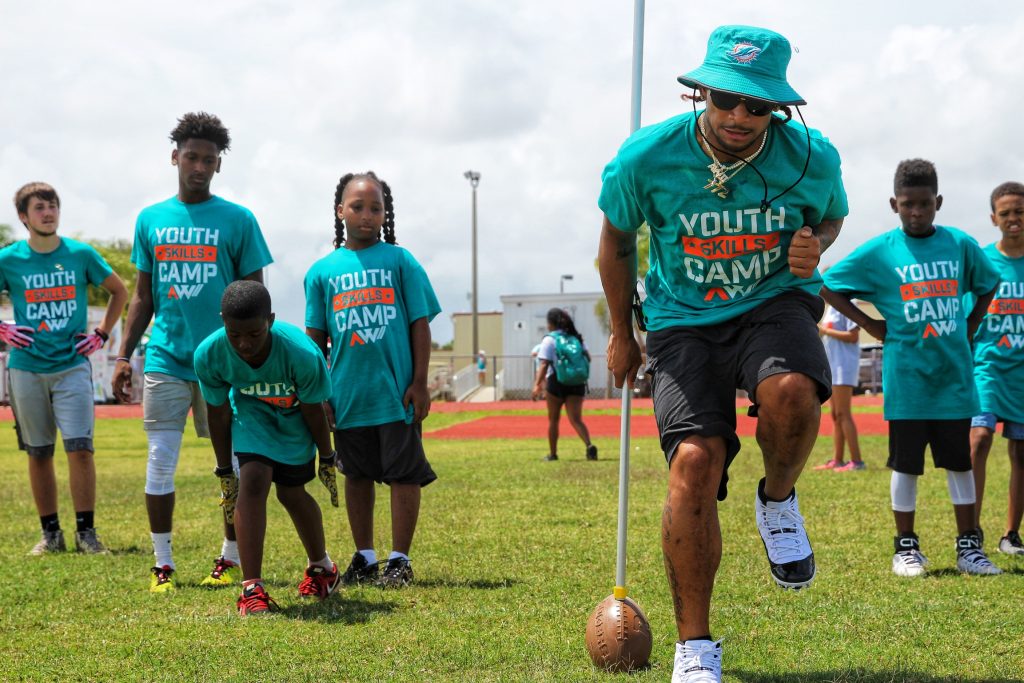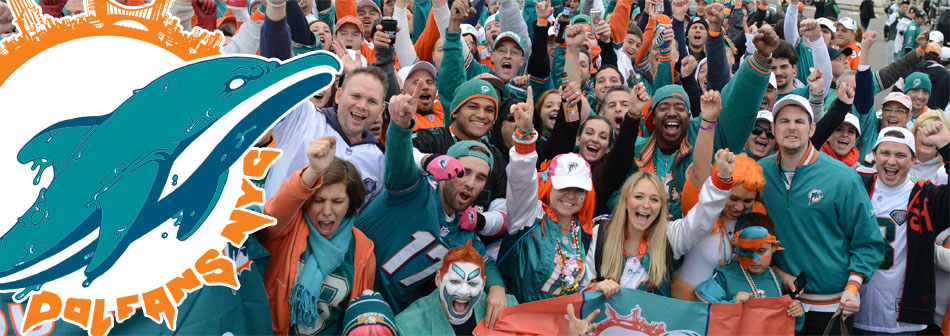Albert Wilson Makes Impact Through Philanthropy, Community Service Initiatives

In Week 8, Dolfans NYC raised over $250 through raffles and donated a total of $500 to The Albert Wilson Foundation, which is committed to creating opportunities that will enhance the lives of children in foster care.
After spending much of his childhood in the South Florida foster care system, Miami Dolphins wide receiver Albert Wilson understands, as well as anyone, the importance of giving back to youth in his community and helping to improve the lives of those less fortunate.
So whether he’s devoting his time or money through the foundation he founded in 2016, Wilson begins each day by asking himself the same central question.
“How can I make a foster kid’s day better?”
That objective entails free, year-round activities for foster children, including youth camps, book drives and holiday giveaways. Wilson, who earned an athletic scholarship to Georgia State, also hopes to open doors for children seeking to continue their education outside of Florida.
“Growing up in foster care, and (having) the opportunity to go to Georgia State, I feel like that was my opportunity to grow and become a better person,” he said. “I don’t want to limit the people in foster care, so our main goal is to get out-of-state scholarships to foster kids.”
As an advocate for foster children, the Fort Pierce, Fla. native recognizes he can make a difference through face-to-face conversations with youngsters in need of guidance from someone who, not too long ago, was in their shoes.
“If it’s just me going over and saying, ‘Hey,’ or if I have to go to a home and talk to the kids, or be that distant role model or that distant big brother for them,” he said, “I just try to (help) any way I can.”
The stories he hears resonate with the 27-year-old, who’s experienced the same frustration and the same despair.
Wilson was placed in foster care twice: for several months at age 6, and again from 12 until he aged out of the system at 18. During those years, while his parents were incarcerated, he shuttled between group homes and foster homes, too many to keep track, until finding security with the Bailey family in Port St. Lucie.
“I love those guys. I met them, maybe a couple of days after the second time I went into the foster care system, when I was in eighth grade,” Wilson said. “I ended up living with them for maybe a year and some change; I want to say (until) my (sophomore) year of high school. They’re a great family. They took in tons of kids and ended up adopting eight.”
When he speaks to foster parents nowadays, Wilson leans on his ongoing relationship with the Baileys, caring people who “do it the right way,” to provide a guideline of how the foster care system is ideally designed to work.
During his stay, he found comfort and support, and more importantly, quickly learned to not blame himself for his circumstances.
“(It’s important) to let the kids know that it’s not their fault that they’re in foster care,” Wilson said. “A lot of kids feel like it’s something they did wrong or they feel like they got the short end of the stick. I want to be out there and let them know that it’s totally the opposite. It’s not their fault and they definitely have the long end of the stick because someone who didn’t know you the day before had the faith and the love to bring you into their home and try to do their best to raise you.”
In 10th grade, he moved in with Robert and Sherri Brown, parents of a high school friend, who he later learned were his cousins. By then, his parents were released from prison, but once Sherri completed her certification to become a foster parent, Wilson opted to remain with her, in Port St. Lucie, in order to stay in the same high school.
Wilson knew returning to Fort Pierce, a city that, at the time, had one of the highest crime rates in the state, could jeopardize his long-held goal of reaching the NFL. As a dual-threat quarterback at Port St. Lucie, he began attracting college scouts at games.
“Fort Pierce is a low-class neighborhood; everybody was just trying to survive and make ends meet,” he said. “Football was pretty much always my escape from that. Football was that one thing that was consistent to me.”
Undrafted out of college, the 5-foot-9 speedster impressed at Chiefs rookie camp and earned his first contract. Four years later, he returned to South Florida, this time as a member of the Dolphins, with the platform to help foster children in the same kinds of unstable situations he once faced.
Looking back, Wilson knows he’s one of the lucky ones, that few find one, much less two families as inviting and nurturing as the Baileys and Browns, without whom he likely never would’ve reached the pros.
“For me, knowing how it is to be with a family, and just having that family support, it was awesome,” he said. “I’m trying to break the line to where (being in foster care) feels like family and doesn’t feel like you’re in a stranger’s home for years.”
Wilson, an inspiration to innumerable adolescents, relays a simple message he hopes serves as motivation during challenging times.
“I try to tell them it’s possible; that I did it, and your dreams can happen,” he said. “(I’m hopeful) I can (convince) them to go down the right path, and grow up and be whatever they want to be.”
Tags: Albert Wilson, miami dolphins

